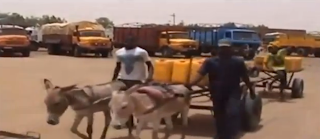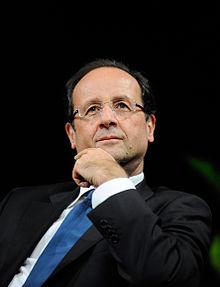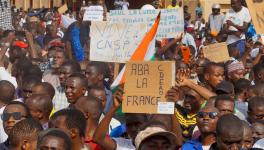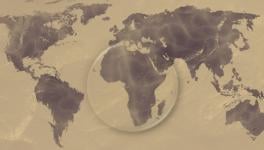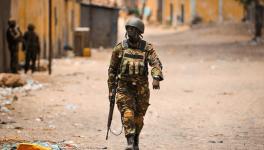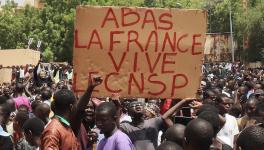Mali Falls Apart.
The French military cannot seem to stay away from Africa. Two years ago, French helicopter gunships entered the standoff in Ivory Coast and French aircraft pummelled the Libyan army.
At that time, most African states were appalled that France would once more enter into what seemed to them to be neo-colonial wars of aggression. Now the French have entered the conflict in Mali. The clarity of the neo-colonialism in Ivory Coast and Libya no longer seem to frame the responses of the African states, some of whom have welcomed French intervention, nor the general discussion in the media and the public. The old mission civilisatrice (the civilizing mission) of French imperialism is back, despite all the fuzzy rhetoric of anti-terrorism.
On January 11, France had launched an aerial attack on Mali and had moved 2500 of its ground troops into action. The purported motive is to save the country from the Islamist fundamentalists. Reports of civilian casualties are pouring out. According to the UN refugee agency UNHCR, nearly 230,000 Malians are displaced internally and an additional 144,500 are already refugees in neighbouring countries. This is not all. The recent hostage crisis in Algeria, across the Mali border, and the deaths of the citizens from many countries, shows that the crisis in Mali is going to have repercussions on the entire Sahel-Sahara region.
The recent crisis in Mali started with the army coup in March 2012, just a month before the elections were to take place in the country. The events that subsequently followed rapidly plunged the country into a deep crisis – political, economic and military. In April, the Tuareg-led NMLA (National Movement for the Liberation of Azawad) declared that the north of the country was now independent. Within a few months the rebels in the north splintered, with three groups of radical Islamists -- Ansar ed-Dine (Defenders of the Faith); the Movement for Unity and Jihad in West Africa (MUJAO); and Al-Qaeda in the Islamic Maghreb (AQIM) – moving their own agenda outside the framework of the NMLA. France, in its Shining Mirages, has moved in to “prevent” the “takeover” of Mali by these Islamist groups. Or so they claim.
France’s “Socialist” President François Hollande said that the threat of a radical Islamic takeover was so imminent that he had no choice but to intervene – to save not just Mali, but all of Western Africa, and the French now imply, Europe as well. The public relations machinery of the West once again went into overdrive. It has to dish out the usual reasons for its military interventions – fear of the jihadists, threats to the values of democracy – both for the Malians (whose democracy had been already constrained by the IMF during the 1990s under the hamstrung presidency of Alpha Konare) and for the people of the entire world. The West’s new divine mission is to wipe off terrorism from the surface of the earth and make it a better place to live – of such vast ambitions is the West’s Burdened.
Beneath the Surface
Mali is crucial to AFRICOM, the US African Command. It is also central to the US Pentagon’s overall MENA (Middle East-Northern Africa) outlook. Mali borders Algeria, Mauritania, Burkina Faso, Senegal, the Ivory Coast and Guinea. Mali is rich in natural resources with gold, uranium, bauxite, iron, manganese, tin and copper. Studies point to plenty of unexplored oil in northern Mali. To be helpful, the US intervened since 2001 to train the Malian army (this was after Konare was forced to take on Mande Sidibe, a former IMF official, as his prime minister in February 2000). In 2005, the US established the Trans Sahara Counter Terrorism Partnership comprising eleven ‘partner’ African countries – Algeria, Burkina Faso, Libya, Morocco, Tunisia, Chad, Mali, Mauritania, Niger, Nigeria and Senegal. Every year this Partnership conducts joint-military exercises. Incidentally, Captain Amadou Haya Sanogo who led the coup in March 2012 was trained by the US and was closely associated with AFRICOM. In June 2012, after the coup, the US produced its National Security Strategy in Africa, whose objective is to “strengthen democratic institutions,” encourage “economic growth, trade and investment,” “advance peace and security” and “promote opportunity and development.” The buzzwords of 21st century imperialism are all intact – democracy (aka subordination to Western pressure), growth (aka neoliberal inequality), and peace and security (aka coordinate with the West to fight jihadis).
The European Union, with France in the lead, is not far behind. France is the old colonial master, and it has edged itself back into the equation. The uranium deposits in Mali and the uranium mines in neighbouring Niger are of particular interest to France, which generates 78 per cent of its electricity from nuclear energy. In September 2011, the EU had come out with its Strategy for Security and Development in the Sahel. This document concluded, “Improving security and development in Sahel has an obvious and direct impact on protecting European citizens and interests and on the EU internal security situation.” This shows the active involvement of both the imperialist blocs in the region.
The active participation of China in this region rattles the US and the EU. Chinese presence in the continent is increasing by the day and Africa provides for one-third of the energy needs of China. During this period of global crisis, the control of regions rich in natural resources and markets assumes enhanced significance.
The domestic situation in Mali provided fertile ground for radical Islamists to take root. The global economic crisis too had impacted the country. Employment fell with many companies in the services sector closing or laying off workers. Tourism and hospitality sectors were badly hit. Except the mining industry, all other sectors of the economy are in a bad shape due to the crisis. The growing numbers of unemployed, falling wages and increasing prices of food grains and essentials had created discontent among the people. The radical Islamists took advantage of this situation.
These radical Islamist groups have a history that is well-known in the highest reaches of Western Power. The Salafist Group for Call and Combat (GSPC), the precursor to the AQIM (founded in 2007), grew out of Algeria’s GIA (Armed Islamic Group). The GIA was a product of Algeria’s security and intelligence services. Furthermore, the AQIM’s own force of arms was bolstered by the men and material that streamed across the border from Libya after the defeat of Gaddafi. This is the ultimate creaming on the pudding, the ingredients for which are supplied by the US and the EU.
There is one another important factor that moved the French into action. In recent elections in Senegal, a president from the centre-left was elected, defeating the French stooge. France is loosing ground in many of the Western African countries and the only consolation for it is Ivory Coast. In Mali, the progressive forces are gaining ground, which is disconcerting to the local elites and their international masters. Considering all these developments as a real threat to tattered French hegemony in its former colonial outposts, it had acted to take the situation into control before it spirals out of its hands.
With the pretext of radical Islamists now given to it, France has moved to assume control over this resource rich region. The US, Canada and the major countries in Europe are helping the French with financial assistance, as well as in training the Malian army and in the transportation of troops. The actual fighting at the ground level, it seems would be done largely by the troops from the West African countries – Economic Community of Western African States (ECOWAS). What these troops will be fighting is not only the radical Islamists, but also the Tuareg nationalists (though NMLN had welcomed the French troops), who have been fighting for their right to national self-determination. Reports indicate that widespread atrocities are being committed on Tuareg people and people of other minority ethnicities. Moreover, the majority of the Malians are wary of the foreign troop presence, given the experience in next-door Libya.
Mali is nearly twice the size of France or Afghanistan. Its terrain is also varied and the troops will be fighting a guerrilla war in the region. All this means that it is likely to be a prolonged war in the region with devastating effects on both the people and the resources. The impact is not going to be confined to Mali alone, as was witnessed recently in Algeria. The entire Sahel-Sahara region will experience its consequences.
Two generations ago, the French were ejected from the region by a strong anti-colonial movement. With the collapse of the anti-colonial agenda and the disfigurement of the nationalist states, the French have seized an opportunity to return. Imperialism plays its dirty tricks – but this time much more cannily than before. One hopes that the experience of the anti-colonial struggle of the 1950s and 1960s will ignite a new anti-imperialist movement.
Disclaimer: The views expressed here are the author's personal views, and do not necessarily represent the views of Newsclick
Get the latest reports & analysis with people's perspective on Protests, movements & deep analytical videos, discussions of the current affairs in your Telegram app. Subscribe to NewsClick's Telegram channel & get Real-Time updates on stories, as they get published on our website.









